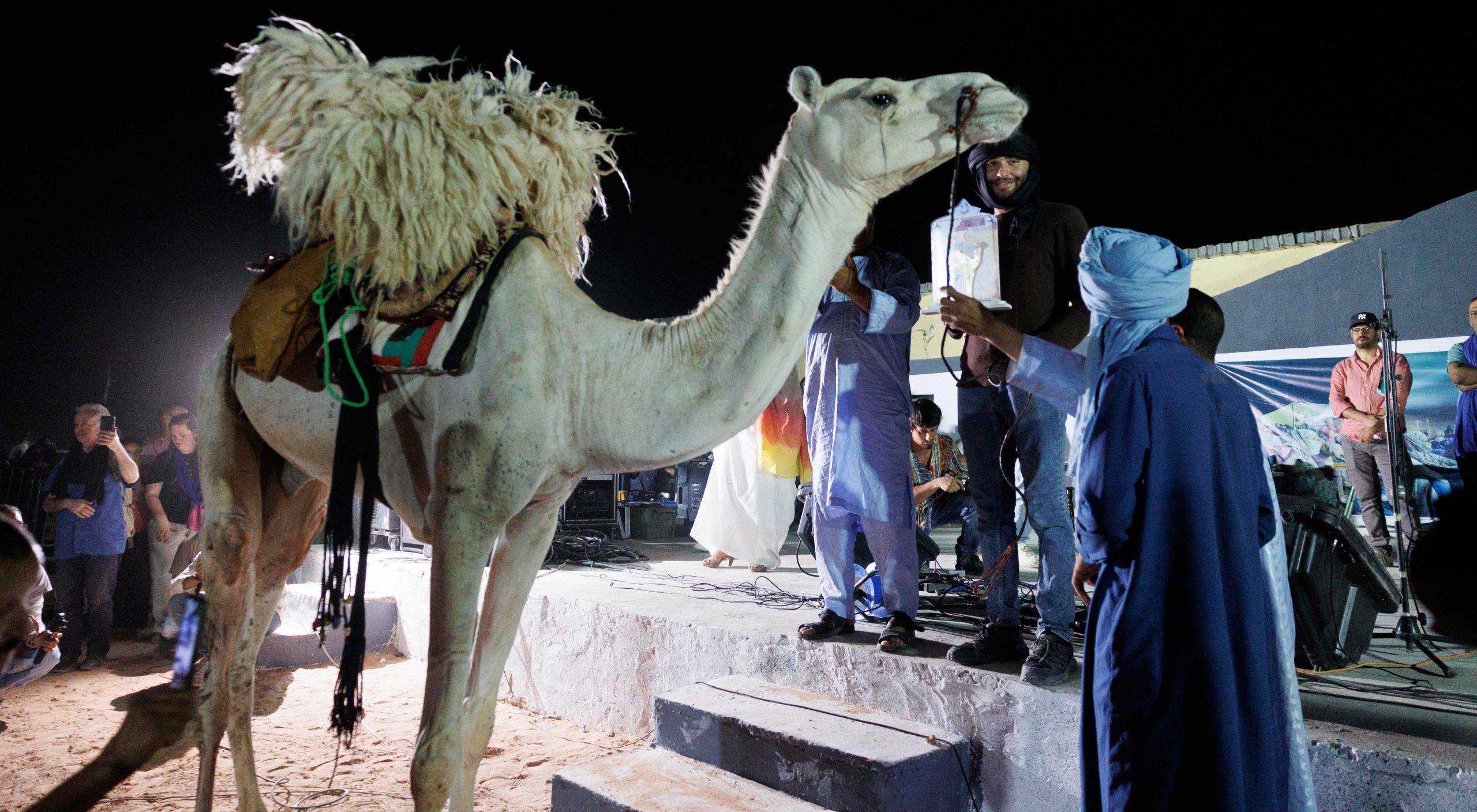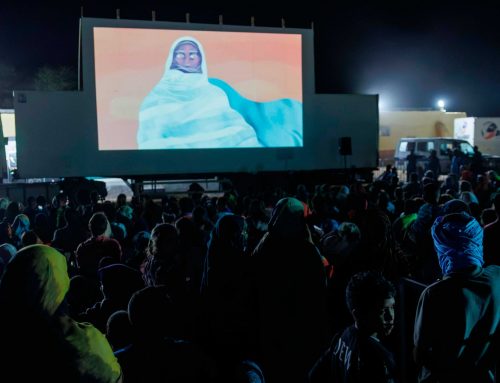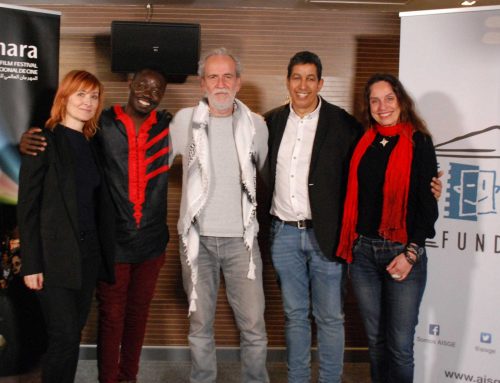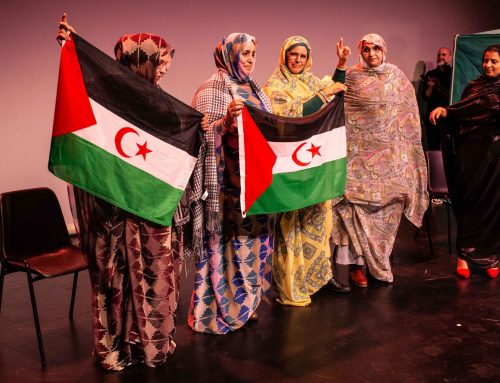The FiSahara (Western Sahara International Film Festival) concluded its 18th edition honoring the theme chosen for this edition: Jaimitna Fi Cinema (Our haima in the cinema): To Resist is to Win. The Palestinian film 200 Meters, directed by Ameen Nayfeh and produced by Ahmad Al-Bazz, won the White Camel last night, recognizing it as the winner of this edition. In this way and in the presence of the president of the SADR (Sahrawi Arab Democratic Republic), Brahim Ghali, and the prime minister Bucharaya Beyun, a week of festival concluded in the Saharawi refugee population camp of Ausserd, in the Algerian Sahara desert.
With the award for this film that narrates the adversities caused by the wall built by Israel in the West Bank and the oppression to which the Palestinian population is subjected, the jury extended the twinning of causes such as the Sahrawi and the Palestinian ones, both resisting non-compliance with international legality by an invading power. Al-Bazz himself, who came directly from the West Bank to receive the award, received the award from the Saharawi Minister of Culture Moussa Salma, and the governor of Jira Bulahi, highlighted her “pride for receiving this award at a festival like FiSahara,” while advancing that “as a photojournalist and documentary filmmaker, I will continue using cinema and its power as a tool of transformation.”

The protagonists of ‘Unsubmissive’ collect the second prize.’ – Sergio R. Moreno
The second prize went to Unsubmissive, the documentary directed by Laura Dauden and Miguel Ángel Herrera that tells of the atrocities and crimes against humanity committed by Morocco against women activists, many of them in Occupied Territories, such as Sultana Jaya, Elghalia Djimi, Mina Baali, Omeima Mahmud Nayern and Jadiyetu El Mohtar. The activists who arrived from the Occupied Territories Elghalia Djimi and Mina Baali were in charge of receiving the award from Galia Yahia, director of Culture of the Ausserd wilaya, and Sidami Hafed, director of the Ausserd Women’s House.

Soraya Bayuelo collects the award for ‘Igualada’. – Sergio R. Moreno
The third award, presented by actor Guillermo Toledo, went to the film Igualada, directed by Juan Mejía Botero, which tells the life of improvement and resistance of the vice president of Colombia Francia Márquez. The National Peace Prize of Colombia and founder of the Montes de María Audiovisual Festival (Colombia), Soraya Bayuelo received the award, which highlighted the bravery of women who fight against oppression.

Activists from Occupied Territories collect their award. – Sergio R. Moreno
Finally, the Eduardo Galeano Human Rights Award recognized the work of the Collective of Activists Defenders of Human Rights in Occupied Territories. The journalist and activist Asria Mohamed presented the award to activists from the Occupied Territories such as Salha Boutenghiza, Mahfouda Lekfir, Nasrathoum Babi, Mina Baali, Laila Lilli, Elghalia Djimi, Soukaina Aamadour and Sidi Mohamed Daddach, known as the ‘Sahrawi Mandela’, among others.
The gala, hosted by the Spanish actresses Carolina Yuste and Nathalie Poza and the Senegalese artivist Thimbo Samb, featured a joint reading by human rights defenders Soraya Bayuelo (Colombia), Milton Carrero (Puerto Rico), Lurdes Pires (Timor Leste) and Ahmad Al-Bazz (Palestine) of a manifesto in solidarity with the Sahrawi people.
The gala concluded with the concert by Pedro Pastor and Álvaro Navarro, putting the finishing touch to a new edition of the festival that, as its executive director María Carrión and the Sahrawi head of Film and Theater in the Ministry of Culture, Ahmed Mahamud Mami, specified during their interventions, “after 20 years behind her, continues to spread weight among so many wars and oppression using cinema as a weapon.”
 Álvaro Navarro y Pedro Pastor in concert. – Sergio R. Moreno
Álvaro Navarro y Pedro Pastor in concert. – Sergio R. Moreno
Culture and identity against oppression
During the closing ceremony, the Le Frig awards ceremony also took place, a space for traditional Sahrawi tents in which the different wilayas (camps) compete in different categories. The winners were led in the national competition by the wilaya of Ausserd, followed by those of Smara, Dakhla, Boujdour and El Aaiún, with Brahim Ghali and Bucharaya Beyun being the ones who presented the award to the first two winners. Likewise, in the regional category, the winning daira (neighborhood) was Leguera, ahead of Zug, Tichla, Bir Ganduz; Miyek and Agüenit.
LeFrig is one of the cultural manifestations that since last April 30th, when FiSahara 2024 kicked off, joined the more than thirty films, as well as numerous round tables and exhibitions that have taken on the epic of resistance as a kind of victory and link between different oppressed peoples, with cinema as the spearhead of cultural resistance.





